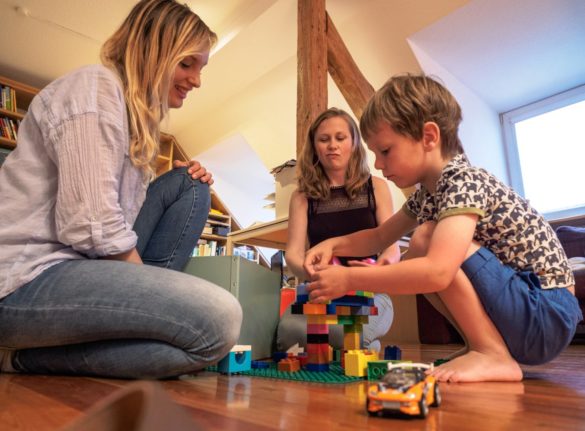It’s often said that the Germans have a word for everything – and that’s true in corona times as well. Around 200 new words including Impfneid (vaccine envy) and Abstandbier (socially distanced beer) have been added to a list of new words by the Leibniz Institute for the German language.
1. When it’s all become too much.
For those feeling overwhelmed by the year-long pandemic, there is Coronaangst (Corona anxiety), coronamüde (corona tired) or überzoom (too much zoom).
2. Love in the time of corona
If you have a specific cuddle partner, they are your Kuschelkontact (cuddle contact). More bleakly, Todesküsschen (little kiss of death) has became synonymous with a friendly kiss on the cheek.
3. Keeping your distance from everybody
The term Babyelefant is now a common concept for anyone living in Austria, where we are urged to keep a “baby elephant’s” distance from one another.
A CoronaFußgruß (corona foot greeting) has replaced the traditional handshake upon meeting people.

4. Panic at the start of the first lockdown
The process of the pandemic can be tracked through new words emerging. At the beginning of lockdown last March, the word Hamsteritis (hamster buying) was widely used, referring to panic buying as similar to a hamster filling its cheeks with food to eat later.
Added to that was Klopapierhysterie, or hysteria over toilet paper running about.
5. Balcony entertainment
As people began singing from their balconies during the spring lockdown, the word Balkonsänger (balcony singer) came into use, along with Balkonklatscher (balcony clapper) Balkonkonzert (balcony concert) and of course Balkonmusik (balcony music).
6. Watching sport during the pandemic
You might want to try out an Abstandsjubeltanz, loosely translated as a socially distanced choreographed dance when celebrating your football team’s win.

7. Mask wearing
The Germans have adopted the British term Covidiot, but have a more specific word of Maskentrottel (mask idiot), for someone who wears their face covering under their nose. A mask worn this way can also be described as a Kinnwärmer or chin warmer.
A mask worn correctly is sometimes referred to as a Gesichtskondom (face condom).
8. Waiting forever for a vaccine
Germany and the EU’s slow vaccine rollout has led to many experiencing Impfneid or vaccine envy as other countries race ahead in vaccinating their citizens.
The words were found by the team of researchers by combing through press reports, social media and the wider internet.
You can find the whole list of new words here.




 Please whitelist us to continue reading.
Please whitelist us to continue reading.
Member comments